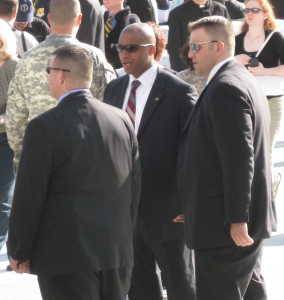 There are several types of administration jobs available with the secret service, and all of them are absolutely essential to protecting the federal government’s highest-ranking public officials. Though the focus is often on Secret Service protection, and the guards who protect the president, vice president, cabinet officials, and key members of Congress, there are many other roles within the agency that focus more on daily operations, administration, and management. These jobs are absolutely crucial to identifying threats, coordinating schedules and protection, and keeping guards properly briefed throughout every shift. Qualified applicants wondering exactly what these administration positions detail can benefit by learning about the most common roles within the agency.
There are several types of administration jobs available with the secret service, and all of them are absolutely essential to protecting the federal government’s highest-ranking public officials. Though the focus is often on Secret Service protection, and the guards who protect the president, vice president, cabinet officials, and key members of Congress, there are many other roles within the agency that focus more on daily operations, administration, and management. These jobs are absolutely crucial to identifying threats, coordinating schedules and protection, and keeping guards properly briefed throughout every shift. Qualified applicants wondering exactly what these administration positions detail can benefit by learning about the most common roles within the agency.
Agency Coordination and Briefing
One of the most important administration roles within the Secret Service involves coordination between the Secret Service Administration and the numerous departments that detect, tack and analyze threats to national security. In this role, skilled managers and public servants are responsible for receiving daily briefings from agencies like the Department of Homeland Security, the Department of Defense, and the Central Intelligence Agency. These agencies will report on any known and tracked threats against the president and other high-ranking government officials who are provided with Secret Service protection. Administrators within the Secret Service will then provide this information to agents responsible for protecting any officials under threat.
This role is typically one of the most vital within the organization, and it is made available only the most skilled applicants. The Secret Service will want any agency coordinator to have experience in public service, a demonstrated history of increasing managerial responsibilities, and an understanding of how government agencies must coordinate in order to analyze threats to national security. Though the position is not appointed, it’s highly exclusive.
Intelligence and Threat Analysts
While agency coordinators within the Secret Service have potentially the most demanding and consequential roles, threat analysts also provide a much-needed service to this valuable part of the federal government. Agency coordinators will pass down information about known threats to these analysts, who will work on determining how they’ll affect staffing requirements, motorcade routes, police involvement, and much more. Analysis of threats directly relates to how many Secret Service agents are in the field, where they’re placed, and how any protected official’s daily agenda might be modified in order to avert a serious threat and a potentially major crisis. Professionals in this role will report to an assigned agency coordinator on a regular basis throughout the day.
Clerical and Executive Administration
Administrative roles within the Secret Service are extremely important. Professionals who manage clerical staff and executive documents must make sure that the agency is running efficiently at a base level. Though many people associate clerical work with menial job duties, the Secret Service affords this role only to skilled and experienced public servants who understand how government works, which agencies they should contact and work alongside, and how their work should be passed up the chain of command.
Related Resource: Become a Secret Service Agent
This clerical position is an example of how virtually everyone within the Secret Service is essential to daily operations and national security, according to US News and World Report. From high-level administrator positions to roles that focus primarily on clerical duties and executive coordination, types of administration jobs available with the secret service all require public service experience, agency knowledge, and a 24-hour commitment to the protection of high-ranking national officials.